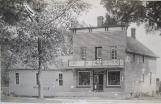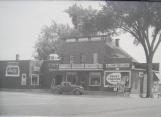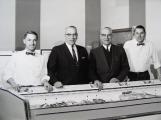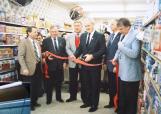2
The Glasgow Trading Post was located at the southeast corner of Lawrence Street and Highway 31 in the village of Vernon, Ontario. The lot was purchased in March 1877 by Thomas Bow of Winchester from William and Mary Porteous. In that same summer, Joseph Taylor constructed the store for Thomas Bow. The Post Office and General Store was named "The Glasgow Trading Post" by Bow, its operator for a few years.George Whitelaw and an assistant, Jessie McConnell, tailored in the Glasgow Trading Post for several years.
Over the years the store underwent many changes, expansions and renovations.
The Glasgow Trading Post became the Porteous Store in 1900. It stayed in the Porteous family for almost 90 years until it was sold to the Tam's in late 1989. The store closed in November 2002 - closing out 125 years as a general merchant and grocery store. New owners are trying to create commercial interest in operating smaller boutique within the space of the old store.
3
View East Along St. Lawrence Street with Porteous Store on the Right1930
St Lawrence Street, Vernon, Ontario

5
The Porteous Store, while the longest lasting, shared the market with others such as The McKercher Store shown with the Vernon Short Course Class of 1935 in front of the store. This store later became McDonalds.7
Footwear and a limited supply of clothing were included in the store's stock. Along with an ample supply of groceries, many bulk items were sold years ago. White and brown sugar came in large wooden barrels but the customer bagged his own, choosing one, two or five pound bags depending upon his individual needs. Bananas hung in huge bunches from the ceiling and once again, depending upon the amount the customer desired, he would break off a smaller bunch. Molasses and vinegar came in forty-five gallon barrels. Shoppers were asked to bring their own containers for these particular products. One time the end of a large barrel of sticky molasses broke as the cask was being "skidded" to the store's basement. Needless to say, there was a terrible mess! Sawdust and shavings were used to clean up the "goo".9
Farmers brought in eggs, chickens, ducks and turkeys to exchange for required grocery supplies These farm products were then taken to Ottawa by sleigh or wagon, and in later years a truck. They were sold in the city stores. Feed obtained from Winchester, coal and kerosene for coal-oil lamps which was taken home in the shopper's own container, were also fast moving products. Beginning in 1915 until the 1960's, gasoline was pumped adjacent to the store. It was pumped by hand into a glass globe measuring one gallon end by using a funnel, the gas was poured into the tanks. The gas pumps were situated behind the actual building but for added convenience when Highway 31 was constructed, they were changed to be parallel with the traffic. In the middle of the century an extra feature was added to W. J. Porteous and Sons. It was an egg grading station. As a sideline to the dairy farming in the area, many kept poultry so there was definite need for the station. Employees, such as Mary Wyatt handled anywhere from 1,000 to 3,500 eggs weekly with a range of payments up to twelve hundred dollars. Farmers brought their eggs to the store. They were candled and weighed. According to the egg's quality the farmers were paid. They were boxed or placed in one dozen cartons then taken to city stores or restaurants. The delivery truck travelling to Ottawa brought back the necessary supplies for the store.11
There were some days in more recent times when employees of the Foodliner could barely survive the seemingly long working hours, but years ago hours were: 7 A.M. - midnight six days a week.The store was heated by two potbelly stoves which burned coal. Every night and morning, including Sunday, the fires had to be stoked. On Saturday evenings the store was like a hall with constant checker competitions on the pickle barrels near the stove. The store was a centre of social activity and all the latest news.
13
Customer satisfaction was definitely apparent as each shopper was waited on individually. An employee, such as Harvey Dalgleish, who worked there in the 1940's, wrote the desired order directly on the bill. Unlike today, credit was granted according to Wilfred's or Howard's knowledge of the customer.Many may remember on the hot summer days when little Leroy had a stand along the highway side selling advance tickets to the annual Ottawa Exhibition. In the thirties when the present highway was built, on the premises tent served as an ice-cream be seen in the above picture.
In 1953, W. J. Porteous and Sons officially entered the IGA franchise. The following year, Wilfred's sons, Bill and Roy, the third generation, became full-time employees.
The old electric till tallied $ 700 to $ 800 for a Saturday's business but sales of today are incomparable to the sales of 1948 for example, which were $ 141,857.11
Known as the Glasgow Trading Post, the little corner store on the main street of Vernon has come a long way and has given the community "what they want".






